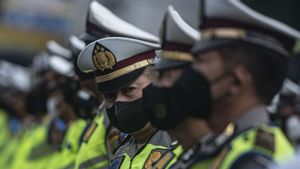JAKARTA – Muhammad Hasya Attalah's family did not expect that, instead of getting a bright spot, the police closed the case of a traffic accident that killed their child on October 6, 2022. The police said Hasya's family attorney, Gita Paulina, considered this case to be out of date, with not enough evidence, and the suspect is dead.
The notification was delivered by the police on January 16, 2023, directly to the victim's family. According to Gita, "How can someone who has died become a suspect?"
"Not checked yet. How can Hasya Attalah be a suspect? He's already dead anyway, how can he defend himself," Gita told the media crew on January 27.
Prof. Hibnu Nugroho, a legal expert at the University of Jenderal Soedirman Purwokerto, considered that making a corpse a suspect was very unusual. Does not refer to the correct case disclosure procedure.
Supposedly, if the place where the incident occurred is clear, and why it happened is clear, the flow continues to the cause, what caused the victim's death.
"If the cause is due to himself, it is not a crime, close the case. Died from an accident, suicide, yes it's over. It's different if you die due to other factors," said Hibnu to VOI on 1 February 2023.

Then, if there is indeed a crime, the next flow is how to determine the terms of the suspect. Criminal law provisions state that at least two pieces of evidence must also have been examined beforehand, at least as witnesses.
Because, said Hibnu, the concept of investigation is a series of investigative actions to collect evidence to determine the suspect. So, it is impossible for someone to be named a suspect before being examined.
"Except for the arrest of the KPK, but if it is in general crime it cannot. The problem of labeling suspects on corpses is legally difficult to accept from the science of case disclosure. Well, this is a bit strange. As for Hasya Attalah, I see it as a normal accident. This is in the context of Hasya Attalah being an accident victim, yes," he said.
As for the SUV driver who ran over Hasya Attalah, Hibnu thinks he could also be a suspect, "Depending on the evidence, if there is accurate evidence that he was the cause of Hasya's death, yes it could be."
“Even though the driver accidentally ran over, could not avoid, was surprised, or something else, the driver of the car that ran over him could still be a suspect. That's why we have to look at it first, hopefully, from the title of the case there will be a bright spot. I don't want to speculate, the process will be proven later," Hibnu added.
Sample case
Many cases of traffic accidents can be a reference. For example, the case that happened to a Transjakarta bus driver named Bima Pringgas Suara. Bima accidentally hits a motorcycle which suddenly cuts into the busway lane. The driver was thrown off the busway lane, while the woman he was riding on was run over.
The incident occurred beside the Jakarta Kota Station, West Jakarta in 2015. Not only was he a suspect, Bima was even sentenced to two years and six months by a panel of judges at the West Jakarta District Court
If viewed from the criminal law perspective, what Bima did was classified as negligence which resulted in other people losing their lives.
As stipulated in Article 359 of the Criminal Code, "Whoever because of his mistake (negligence) causes another person to die is punished with imprisonment for a maximum of five years or imprisonment for a maximum of one year."
Article 310 of Law Number 22 of 2009 concerning Road Traffic and Transportation also regulates this matter. Paragraph (3) states, "Anyone who drives a motorized vehicle which because of his negligence causes a traffic accident with the victim being seriously injured as referred to in Article 229 paragraph (4), shall be punished with imprisonment for a maximum of 5 years and/or a fine of up to IDR 10 million .”
"In the case of an accident as referred to in paragraph (3) which results in another person's death, the penalty shall be imprisonment for a maximum of 6 years and/or a fine of up to IDR 12 million," the contents of paragraph (4) of Article 310.

“From these articles it is also clearly implied, Negligence is in the sense of towards people, not negligence in oneself. The interpretation is like that," said Hibnu.
Another example can also be seen in the case of Tubagus Joddy, Vanessa Angel's driver. Tubagus's actions were considered negligence which resulted in the death of the passengers, none other than Vanessa Angel and her husband. In the end, Tubagus was also named a suspect and sentenced to 7 years in prison.
This means that not only those who crash, drivers who endanger their passengers causing injury or death can also be punished if they are negligent in driving. In fact, the punishment can be even more severe if the driver does not provide assistance.
If it is proven that the SUV driver who ran over Hasya Attalah did not provide assistance, the driver has the potential to be entangled in Article 312 of Law Number 22 of 2009 concerning Road Traffic and Transportation
"Anyone who drives a motorized vehicle who is involved in a traffic accident and intentionally does not stop the vehicle, does not provide assistance, or does not report the traffic accident to the nearest Indonesian National Police as referred to in Article 231 paragraph (1) letter a, letter b, and letter c without reason, should be punished with a maximum imprisonment of 3 years or a maximum fine of IDR 75 million.”
Fact Finding Team
Gita suspects that the police deliberately stopped investigating the case just to protect the SUV driver who ran over Hasya Attalah, who is known to be a retired police officer with the rank of AKBP.
"There are many irregularities. In addition to naming Hasya Attalah as a suspect, why didn't the police immediately confiscate the car that was run over. Meanwhile, the victim's motorcycle is still being confiscated for evidence," she said on January 27.
That is what ultimately made the Hasya Attalah traffic accident case catch the public's attention. National Police Chief Gen. Listyo Sigit Prabowo ordered Metro Jaya Police to form a Fact Finding Team (TPF) to thoroughly investigate the case.
VOIR éGALEMENT:
Not only involving the internal police team, Metro Jaya Police Chief Inspector General Fadil Imran said TPF also involved an external team consisting of several transportation experts and legal experts.
"Each of TPF's findings is expected to fulfill a sense of justice and legal certainty," Fadil told the media crew on January 30.
Hibnu also hopes, "The results can be more transparent and provide justice for all parties."
The English, Chinese, Japanese, Arabic, and French versions are automatically generated by the AI. So there may still be inaccuracies in translating, please always see Indonesian as our main language. (system supported by DigitalSiber.id)














